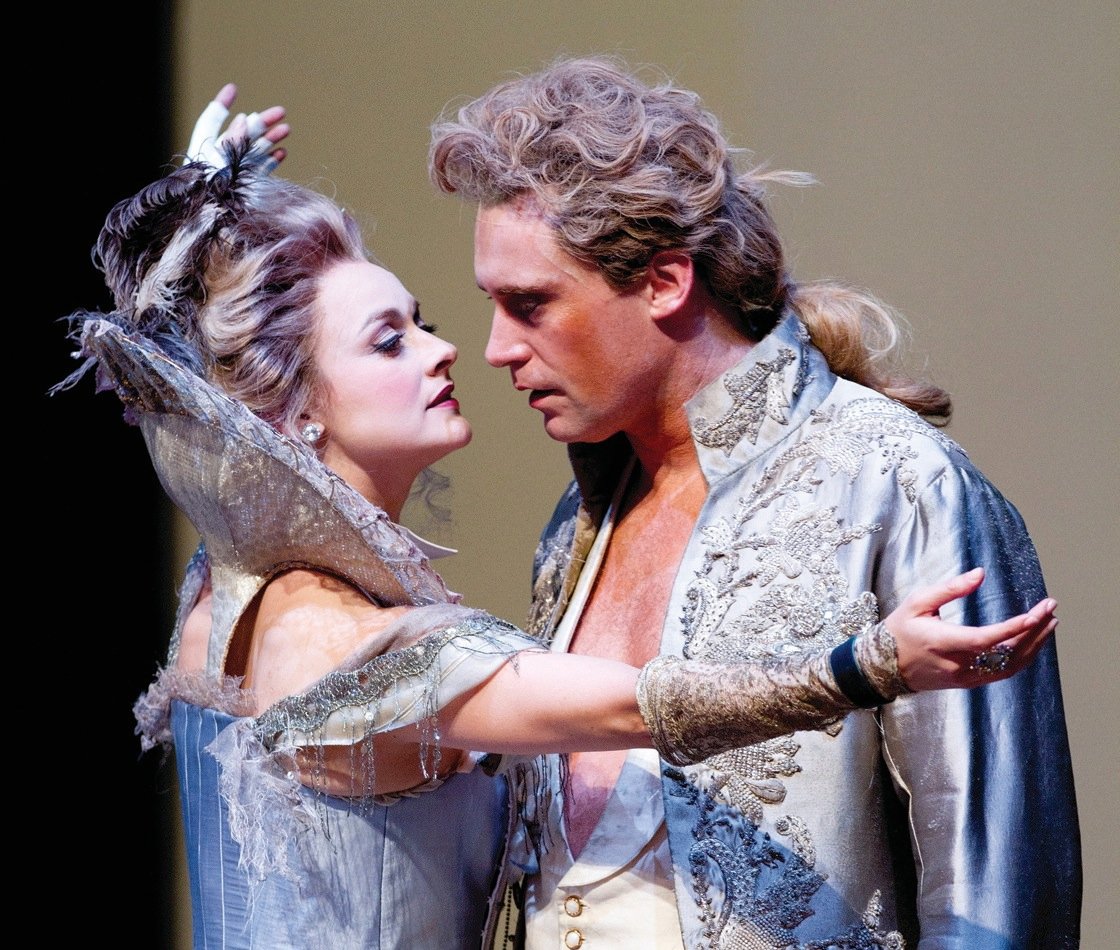
If ever a Shakespeare play allowed for inconsistencies, it’s
A Midsummer Night’s Dream. Its REM-random fusion of Greek mythology, fairy tales, courtly love, and cringe
comedy comes across as absurd on paper, and yet the play’s sweet nature (at least
superficially) and fantastical elements make it one of the most widely performed shows
in human history.
Ethan McSweeny’s production, currently playing at Shakespeare Theatre Company’s Sidney
Harman Hall, embraces these discordant elements wholeheartedly. Theseus (Tim Campbell, doing double duty as Oberon) and Hippolyta (Sara Topham, also Titania) kick off the proceedings by addressing the audience, from a balcony,
Juan and Evita Peron-style. Though the action is supposedly set in the 1940s, Demetrius
(Chris Myers) sports a prep-school blazer and feels for all the world like an even preppier Carlton
Banks,
Helena (Christiana Clark) waltzes into her first scene clutching shopping bags, and
Lysander (Robert Beitzel) insists on serenading everyone with his guitar like an emo kid who’s just discovered
Neil Diamond.
What elevates the show above so many others, however, is McSweeny’s boundless creativity
in dealing with the fairies and his deft hand with the rude mechanicals.
Lee Savage’s set is deceptively simple, relying mainly on lighting to transform it from Athens
to forest to magic kingdom, but it incorporates hidden trap doors, ladders, chandeliers,
and even a grand piano to allow Puck (the brilliant
Adam Green) and company to appear, disappear, and leap in the air, as if by, well, magic.
The shabby-Renaissance-chic costumes
Jennifer Moeller has decked the fairies in seem to pay homage to Annie Lennox music videos and Victoria’s
Secret catalogs, but they also hint at the art of theater itself, as the actors try
on bustles, corsets, and wigs. (Mischievous Puck also emphasizes the power of theatrical
illusion when he chases the lovers around brandishing a dry ice machine.) The only
odd note costume-wise seems to be Helena, who’s dressed in a graceful (and adult-appropriate)
orange suit, while Hermia (a spirited and engaging
Amelia Pedlow) wears a school uniform and Lysander a plaid shirt.
The lovers are compelling and funny to watch, but they’re upstaged by the Mechanicals,
and the play’s elaborate subplot involving Nick Bottom (Bruce Dow). Dow is utterly obnoxious as Bottom, hiding the character’s comic ignorance under
a layer of diva-like petulance and absurd self-satisfaction. It’s brilliantly effective
when paired with
Ted van Griethuysen’s
understated but lovely performance as the ambitious Peter Quince, David
Graham Jones as Francis Flute,
Herschel Sparber as Tom Snout,
Robert Dorfman as Snug, and
Christopher Bloch as Robin Starveling. Rarely are the Mechanicals so sympathetic, or so inventively
dopey.
McSweeny also adds freshness to the Titania/Hippolyta and Oberon/Theseus roles, suggesting
quite clearly at the end of the show that the characters have been interchangeable
all along. Topham is graceful but ballsy as the Queen of the Fairies, and her meek
submission to Oberon after an interlude with Bottom seems to echo the “taming” of
Amazon goddess Hippolyta by King Theseus. The continually shifting balance of power
between the two couples makes them some of the most interesting characters to watch,
and Campbell embodies Oberon with a sense of morality, despite all his more questionable
actions.
This could be an easy enough show to interpret, particularly come holiday time, when
all anybody wants is magic and a sense of joy. But this thoughtful, relatively risky
take on a familiar classic is well worth experiencing.
A Midsummer Night’s Dream
is at Shakespeare Theatre’s Sidney Harman Hall through December 30. Running time is
about two hour and 45 minutes. Tickets ($43 to $105) are available via Shakespeare
Theatre’s website.


















